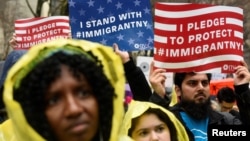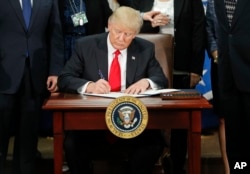U.S. officials say President Donald Trump is expected to sign an executive order that would impose a temporary ban on most refugees and a suspension of visas for citizens of Syria, Sudan, and up to five other Middle Eastern and African countries.
The order is not likely to include a ban on religious minorities escaping persecution.
Sudanese Americans say the ban would be a big mistake.
Rudwan Dawod, a Sudanese American living in the west coast state of Oregon, said the order would affect the most vulnerable Sudanese seeking refuge in the United States. Sudan is a Muslim majority country.
"This decision is going to affect the lives of so many innocent people, especially refugees who are fleeing the dictator and radical Islamic government, and they are being punished by not thinking the same way and now they are being punished again by Donald Trump and it is just not fair," Dawod said.
Advice for Trump
Mohammad Badawi, a Sudanese citizen and lawyer who works for the Africa Center for Justice and Peace studies in Uganda, said he is not convinced that banning Sudanese from traveling to the U.S. will make America any safer. He advised Trump to think more strategically.
"Let us try to look at the issue of the security in a more global way. We have to get to the real reason why this is happening, and think about the measures that should be taken," Badawi said.
Dawod, who received his U.S. citizenship six years ago, said the order would affect his family personally.
"I have just started a process to bring my 74-year-old dad in a legal way. And I am expecting this decision to affect his process because I want him to be reunited with my family, and now it seems like it will be really difficult for them to come to the U.S.," Dawod said.
Dawod said he will contact his representative in Congress to ensure that his concerns are heard.
In a series of tweets, Trump had said he planned to focus on national security Wednesday.
During the U.S. presidential campaign, Trump proposed banning foreign Muslims from entering the United States. He later walked back such a blanket ban, instead saying people from countries flagged as terrorism concerns would be subject to "extreme vetting."





